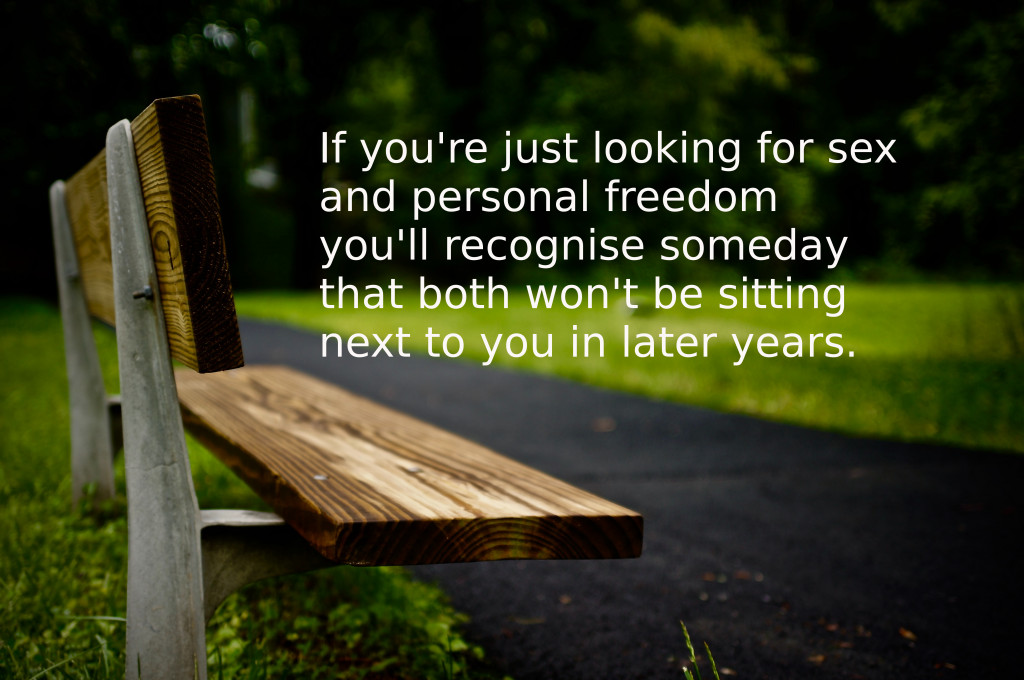Oh, Freedom…¹

Actually, I do not like these memes in social networks at all and usually keep away from posting them on my part.
But.
In a somewhat contrary fashion, the picture above contains an important truth concerning multiple relationships – especially in an oligoamorous setting.
Well – it touches (once again) the topic of sexuality and the freedom of love. And I have already laid down in my second Entry why I do not like the way these topics are currently covered by Polyamory and why I started to describe myself in that regard as “oligoamorous”. And in Entry 7 I try to explain why commitment and freedom do not contradict each other in Oligoamory.
So it’s freedom – once again.
Especially our personal freedom, which we always believe to be in danger, particularly when we think that other people in our immediate vicinity are restricting us somehow.
At the same time, we, who think in terms of multiple relationships, are – as far as “freedom” is concerned – already rather privileged.
Privileged? Yes, privileged. We have a privilege. The degree of freedom in our relationships – which we have worked out individually, which we share with our partners and which we mutually grant ourselves – that is a privilege.
“A privilege – I beg your pardon, Oligotropos, you call strange things a privilege… I just care about my personal freedom and do not want to be limited by any conventions, that’s all…“
But exactly that’s a privilege, dear friends!
Privilege: The thing you own and display but usually never think about.
The “thing” that only becomes apparent, when you suddenly change context – e.g. if you move into a non-privileged one.
For better understanding a personal example:
We “multiple-relationship-seekers” know that non-monogamous dating isn’t that easy. Hardly anyone admits it openly; like-minded people, who also live models of ethical non-monogamy are usually scarce in ones own periphery. Accordingly, once again the world-wide-web has to compensate… But even out there aren’t too many sites who deal with ethical Non-monogamy or Polyamory – and if it is actually the case one encounters the 200-300 “usual suspects” who are scattered from Flensburg to Garmisch-Partenkirchen – crap!
Last resort: Sign up to a conventional dating-forum. With 200 participants? Pah, there are even more people living in my small town… With 5000? Nice – but there’s still room for improvement… Ah, look there: Almost 30.000 members. That sounds good. Referring to Germany as a whole, it’s still a modest probability (strictly speaking…) – but at least a better chance. That way, I quickly logged into a Facebook-forum “Find new friends and fall in love” (kind like that). And one Friday-evening I obediently posted my introduction according to the rules, featured myself interestingly and honestly – of course, including a smart picture of mine.
Honestly: By that I mean that I posted as well that I considered myself to be part of multiple relationships (and already was).
And then all I had to do was wait and see.
OK – of course I had already seen that when a woman made her appearence, she collected in a short time (2-3h) about 70 to 80 likes and gathered in the same period a full dozen of more or less meaningful comments, including PN offers. If a man appeared, he gathered in the same time about 1 to 3 likes and sometimes someone dared to post a comment.
That in mind I thought that I had approached the matter modestly enough – and was actually waiting for the first stupid comment regarding my statement concerning the multiple relationships. Nevertheless, I was not really prepared for what actually happened.
In the following 72 hours of a busy forum weekend and a following cheerful Monday, there happened… …nothing. No comment, not even a silly one – and not a single “like”. Not even when I commented on myself on Sunday evening, in order to push my post back to the top of the newsfeed. No reaction at all.
That, dear reader, can be a manifestation of privilege, too. And if you become aware of it in such a drastic way. When one realises what exorbitant measure of personal freedom one already has – which for other people is an absolutely unimaginable no-go, almost a blemish, but in any case a “don’t-touch-it”.
Even with a moderately camouflaged screwing-offer, I would probably have received more reaction in the appropriate forum than with an introduction that depicted me as such an odd screwball of non-monogamy. Probably even if I had advertised myself with the same text as well-behaved single – but not as (potentially) “taken” according to the worldview there.
These too can be repercussions of freedom. And the risk that one assumes regarding the freedom of authentic and honest self-expression.
“Oligotropos, then do not be bluntly honest next time, but wait and see how things develop…“
You didn’t say that – or thought it – or did you?
As the author of this blog I would like to make it clear that we, who advocate ethical non-monogamy – especially because freedom is so important to us – have closed such a (back)door by choosing our particular relationship-philosophy (or at least: should have closed…).
“But my freedom to do as I see fit, to do as I choose…!”
Oh, freedom. Which currently seems to be at the centre of attention again because for many people in this world that privilege is far from being as natural as it is for us. Even the quarterly magazine of the Max Planck Society, which I received just yesterday, is dedicated to this title theme in its current issue.
Of course, this journal deals with the freedom of science and research – but that is enough to re-establish context regarding the much-debated concept of freedom.
For everything that concerns our personal freedom is largely covered in Germany by our Constitution (»Grundgesetz/Basic Law« – in particular in the fundamental rights Articles 1-19). I have always thought our Constitution to be rather prosaic and austere, but on closer examination its phrasing is surprisingly comprehensive.
Of course, I love Article 1, which attributes to us all indefeasible human dignity – and if I have my idealistic 5 minutes, then I think that this article alone could have been sufficient, because in it the most important and essential principle is summarised already.
And possibly it would have been enough if we were always aware of our human dignity and that of other people in every situation (which Prof. Gerald Hüther questions in his book “Dignity”).
Nevertheless, even the mothers and fathers of our constitution seem to have suspected that this wouldn’t be the case. Since in Article 2, paragraph (1), they appear to limit our personal freedom – interestingly because of the “rights of others”. And since we haven’t come very far in the text of the constitution until Article 2 yet, these “rights of others” in turn seem to be constituted in their dignity and their right of personal development.
Indeed: By law I am limited in the enjoyment of my personal freedom by the dignity and the personality of other people…
“Ah – that’s why I will end up lonely on a bench in my later years. Because my personal freedom is limited anyway and therefore my freedom of love and the freedom to explore my sexuality as I see fit, too…”
No.
In my last Entry 27, I explained how quickly our desire for true intimacy is “confused” with sexual desire, or even equated with it. For that reason I emphasised why it is so important to be honest to ourselves, which needs lie behind our wish concerning the implementation of multiple relationships in our life.
“Sexuality,” once Marshall Rosenberg² said, “is not a need but a strategy.” When I first heard it, I was angry regarding his assignment – then I pondered on it for a while – and finally I realised why he was right: Because deep down we seek out relationships to experience intimacy, because of our need for familiarity, for closeness, for affection, connection and an emotional home.
Of course, sexuality can be part of the fulfilment. But (at least in my case) it wouldn’t be honest to call sexuality a “need” for it would appoint only a part of the truth as an end in itself – instead of the far more complex entirety of reasons behind it (and if so, then I certainly wouldn’t need such elaborate models like Poly-or Oligoamory).
But if I wish to be blessed with true intimacy until later years (I repeat: familiarity, closeness, affection, connection, and an emotional home), then I probably need these “other people” in my life as well – with whom I can experience this yearned-for and appreciated state.
“Come on – other people can be found on every corner – almost 8 billion will be on Earth soon…“
That may be so. At the same time, I would like to point to my experience above in the FB-forum, which proved that there are still just a few people who are willing to share our privileged kind of relationship ethos. And of those, realistically, even fewer can be considered as potential loved ones for us (and we for them, by the way).
That’s why it is important that I do not handle the privilege of my “extensive personal freedom” like the literal ax in the woods. Because that way I’m probably going to curb somebody in his personal development here (Oops...) and curtail soemone else concerning her dignity there (Ouch!). By that manner I’ll definitely end up lonely on the park bench someday…
Therefore, I have to make sure that I carefully balance the privilege of my freedom with the privilege of my chosen loved ones.
“Ethical Non-Monogamy” means, in a way, that I no longer regard my “personal freedom” as an unconscious privilege (“Here I go again on my own…!”) – but rather that I am always in a constant dialogue, almost in a kind of dance, regarding my freedom and the freedom of the people around me. The dialogue – or the the dance – is conducted in dignity and respect – sort of like a motto, but at the same time a kind of self-commitment. This performance (only) succeeds, because everyone involved proceeds by the maxim “Do unto others as you would have others do unto you.”
In this manner, my freedom, my personal development, my need fulfilment strategy always exist in a dynamic pattern with the freedom, the personal development and the need fulfilment strategies of the others.
And out of this dynamic on this playing field of coexistence, all significant values of ethical non-monogamy emerge, whether they are poly- or oligoamorous: Compassion, appreciation, cooperation, self-responsibility, forgiveness, clarity, utterly perfect honesty – and a good measure of serenity.
If we would be able to mutually ensure these things towards each other we would go far. If we keep on working together towards these goals, then we are on a great path – for we have understood that our personal freedom is not a static privilege, but a collective achievement that we establish anew every day by giving our best.
Today I would like to leave the final words to the satirical writer Johannes Trojan, whose text I modified a little bit:
»It is striking that in old tales there is little talk of the freedom of love or of freedom itself in the way of special privilege. To our forefathers, love seemed to be natural.
And maybe they hadn’t yet a clear idea of freedom, or they might have taken for granted what they knew as the freedom of love and saw no need to emphasise it.
Now, however, no lover can sit any longer in front of a cup of coffee without expressively affirming that he feels “loving and free” and that he can not live without his freedom of love.
May there come a time when there is less insistance on love and its freedom again.
They both seem to suffer from it.«³
PS: Recommended further reading “17 DOs and DON’Ts of Open Relationships” by Alexander Cheves
¹ “Oh, Freedom” is a post-Civil War African-American freedom song, composed in the 1860s. It is often associated with the American Civil Rights Movement – but was ever since instrumentalised in several political campaigns as well.
² Marshall B. Rosenberg developed an extensive system of needs – which motivate our every thinking and communicating – as a reference frame for his “Nonviolent Communication”.
³ Original text by Johannes Trojan from “Auswahl aus seine Schriften” (Stuttgart 1905):
»It is striking that in ancient German songs there is little talk of German freedom and of Germanism in the way of a special privilege.
To our forefathers it seemed to be natural that a German is German. And maybe they hadn’t yet a clear idea of German freedom, or they may have taken for granted what they knew as German freedom and saw no need to emphasise it.
But now no German can sing a song by his drinking glass without expressively asserting that he feels “German and great” and that he can not live without German freedom.
May there come a time in which less is drunk on Germanity and German freedom.
They both seem to be suffering.«
Thanks to by Eric X on Unsplash for the photo!




